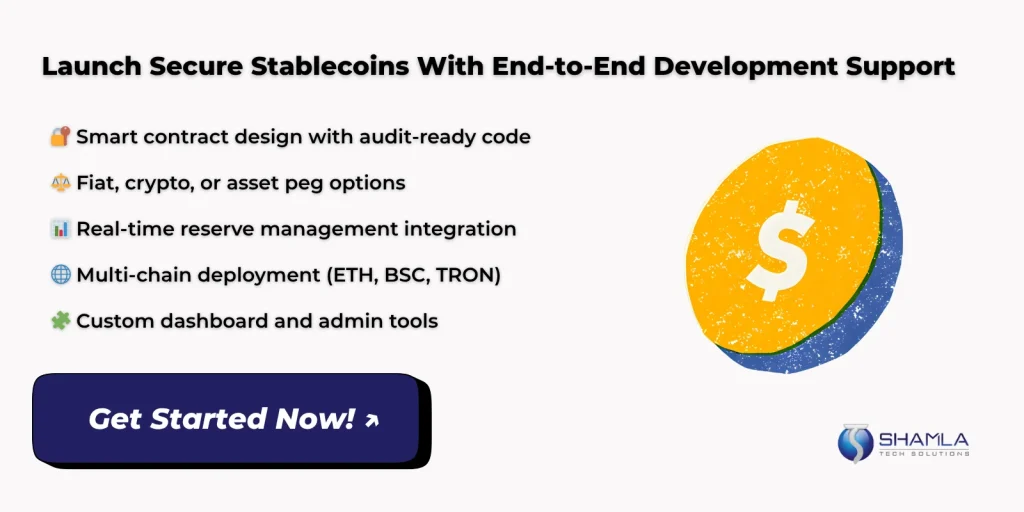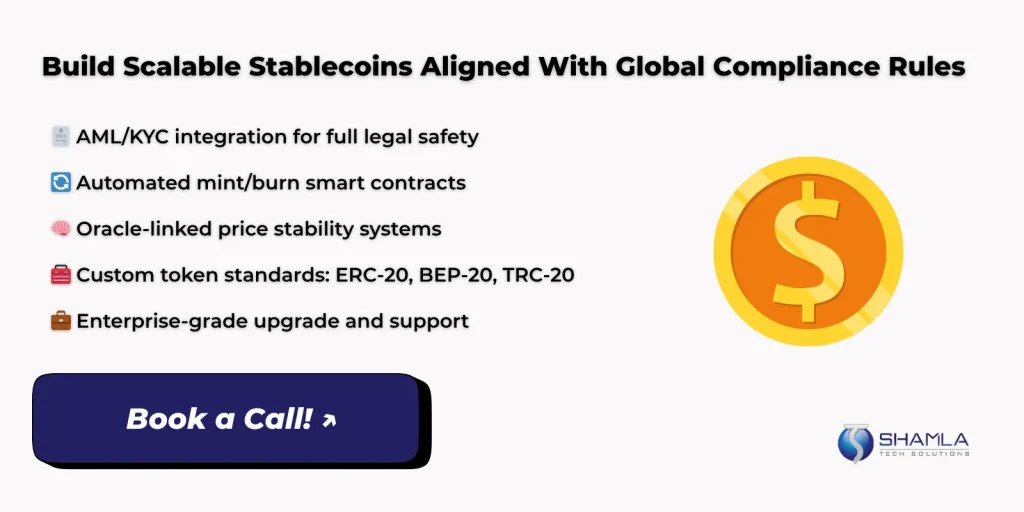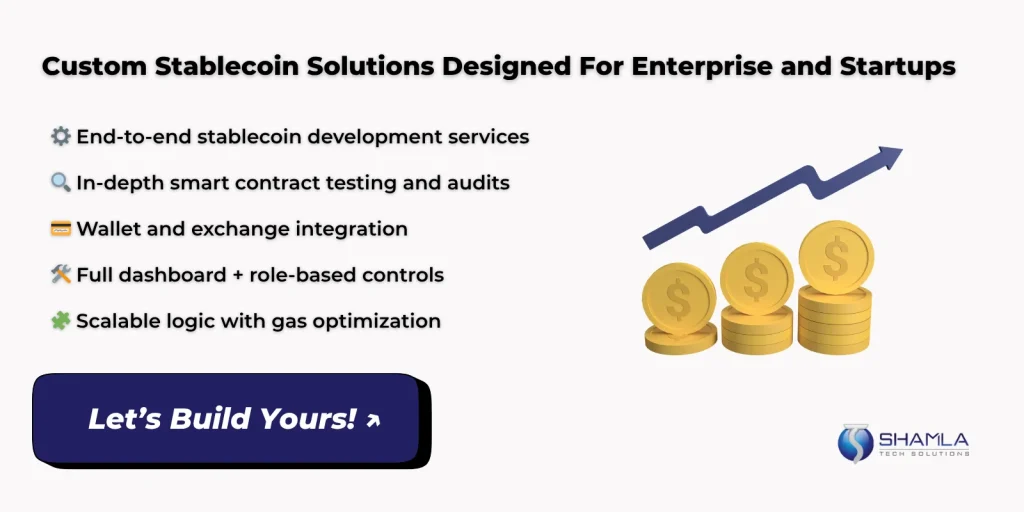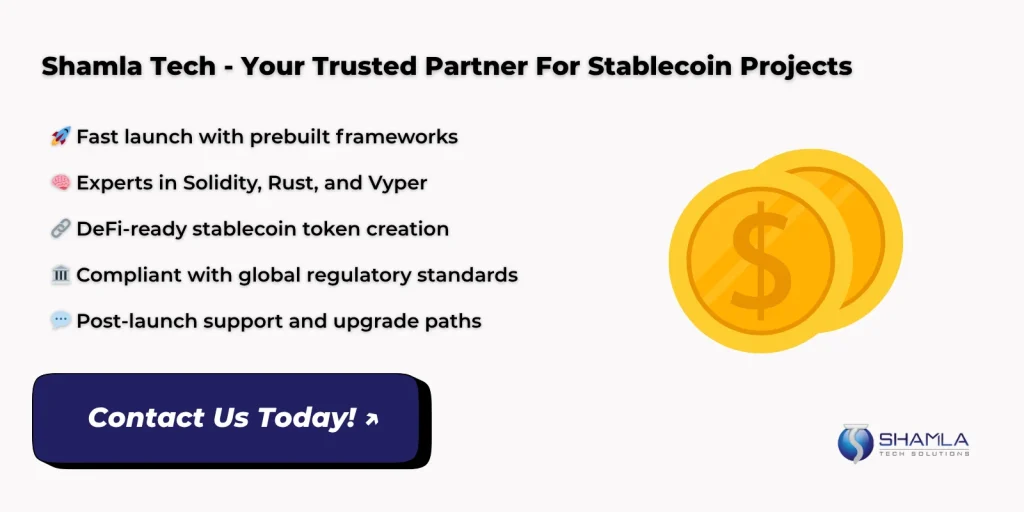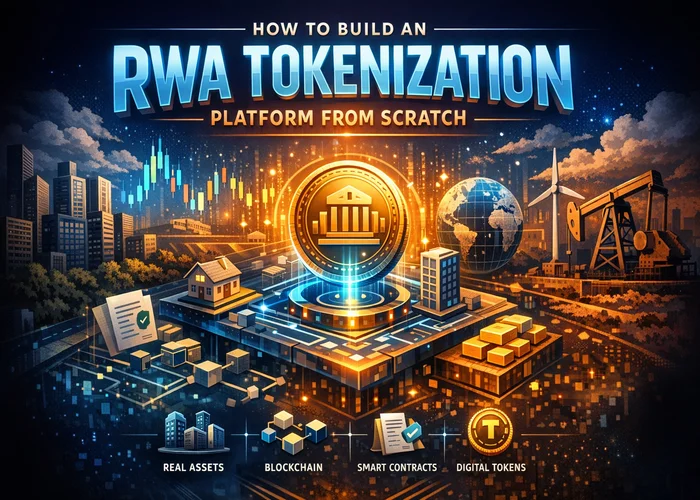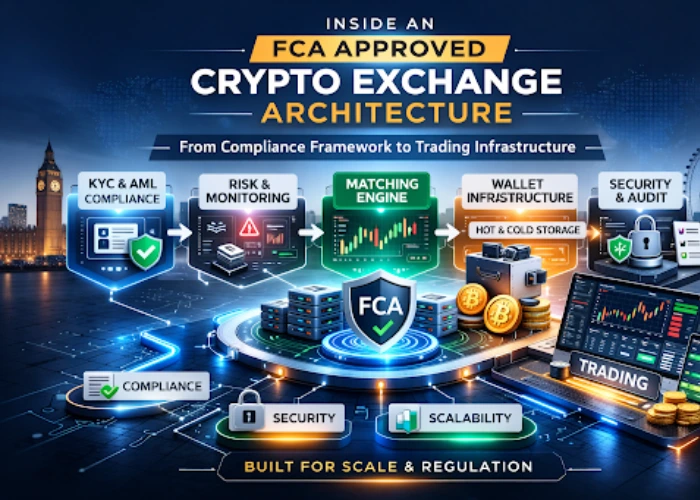Businesses and apps need payment systems we can trust. Stablecoin smart contract development services build stablecoins that keep a steady value by tying to real assets. Developers write clear code that automates minting, burning, and transfers. These services include security checks and automated tests to stop hacks.
Once deployed, the contracts run on blockchains without middlemen, cutting delays and fees. Users enjoy predictable tokens backed by dollars or crypto, which boosts stablecoin adoption across wallets, exchanges, and payment networks. This precision cuts business risk, speeds integration, and helps firms scale token operations safely. Enterprises gain cost savings and clarity.
What is Stablecoin Smart Contract Development and Why It Matters
Stablecoin smart contract development services let teams build code that issues tokens tied to real assets. A smart contract is a self-running script on a blockchain that handles stablecoin token creation, minting, and burning without manual work. Developers design modules to check collateral levels, enforce limits, and log events. This model supports different types of stablecoin, including fiat-backed, crypto-backed, or algorithmic tokens. This setup prevents human error and ensures predictable behavior. Code deploys on networks such as Ethereum or Binance Smart Chain for broad reach, reliability, and global scalability.
Stablecoin development services power new payment rails in finance and blockchain networks. Services cover stablecoin token creation templates and governance setups for various types of stablecoin, ensuring rules match asset pools. Businesses link code rules to collateral reserves for low price swings, boosting stablecoin adoption in commerce, lending, and cross‑border transfers. By using simple contract calls, firms avoid bank gatekeepers and speed processes. Teams rely on built-in audit trails to meet transparency goals. Developers use patterns for reserve checks and event logs. Enterprises tap stablecoin development services to launch products quickly on public chains.
Why Stablecoin Smart Contract Development Services Matter
1. Price Stability:
2. Trustless Execution:
3. Automation Efficiency:
4. Scalability and Performance:
5. Wide Use Cases:
What You Get with Stablecoin Smart Contract Development Services
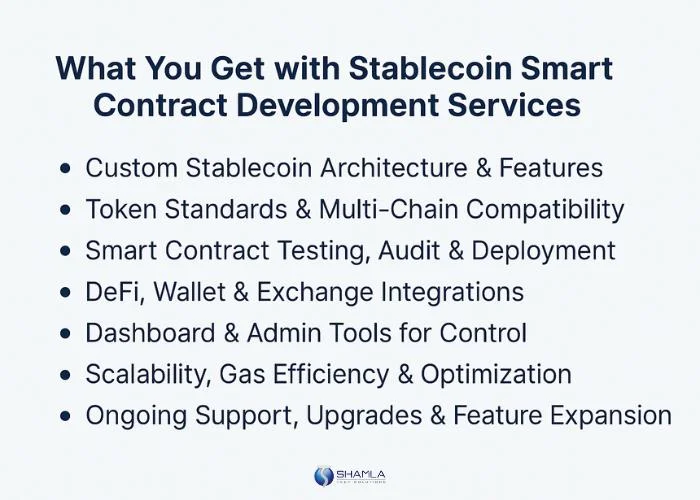
1. Custom Development Features and Options
2. Token Standards and Network Support
Integrating stablecoin smart contract development services means choosing token standards like ERC‑20, BEP‑20, or TRC‑20. Each standard defines functions such as balance checks, transfers, and allowances. Developers implement metadata fields for symbol, name, and decimals. They configure a supply cap and initial minting. Network choices affect transaction fees and confirmation times. Teams handle bridge setups for cross‑chain transfers and apply gas‑saving patterns.
Code includes batch transfer functions to speed payouts. This process simplifies stablecoin token creation on multiple blockchains and ensures compatibility with wallets, exchanges, and DeFi platforms. Robust testing confirms adherence to each protocol’s rules.
3. Audit, Testing, and Deployment
Using stablecoin smart contract development services ensures in-depth code audits, static code analysis, and rigorous formal verification. Auditors run security tools to spot overflow bugs or reentrancy flaws. Developers write unit tests and integration scripts covering edge cases. They simulate high‑volume transfers, oracle failures, and reserve shortfalls. Testnets mirror mainnet gas conditions to validate performance.
Once testing passes, teams deploy via verified scripts and tag contracts in version control. Deployment pipelines include rollback plans and multisig governance for upgrades. This process ensures a safe launch and aligns with best practices. Professional audit reports and test coverage metrics add confidence for regulators and partners.
4. Integration with Wallets, Exchanges, and DeFi
Using stablecoin smart contract development services, teams build connectors for popular wallets like MetaMask or Trust Wallet. They register token symbols on‑chain registries and handle token listings on exchanges. API endpoints support deposit, withdrawal, and balance queries. Connecting with DeFi platforms requires setting up token allowance mechanisms and enabling liquidity pool operations.
Developers provide SDKs in JavaScript and Python for dApp builders. They supply sample code for swap routers and staking contracts. By automating these steps, businesses get ready access to lending markets, payment gateways, and staking services. Onboarding partners becomes frictionless, boosting stablecoin adoption in retail and institutional markets.
5. Dashboard, Admin Panel, Support, and Upgrades
Engaging stablecoin smart contract development services delivers an admin dashboard with real‑time metrics on supply, reserves, and transaction volume. Custom stablecoin development teams build panels to pause contract functions, adjust fee rates, or add new collateral assets. They set up role management to grant or revoke admin rights.
Support includes on‑call fixes, patch deployments, and guidance for governance votes. Upgrade paths use proxy patterns to swap logic without losing state. Documentation covers API calls, UI flows, and troubleshooting guides. These stablecoin development solutions ensure operators manage tokens confidently and roll out enhancements without downtime or data loss.
6. Scalability and Performance Optimization
High‑traffic tokens require efficient code. Custom stablecoin development focuses on gas‑saving techniques like tight data packing, minimal storage writes, and reusable libraries. Developers split logic into core and extension contracts, enabling parallel processing of mint and burn requests. They deploy on Layer 2 rollups or sidechains to reduce fees and latency.
Off‑chain order matching and batching APIs cut on‑chain calls. Monitoring tools flag performance bottlenecks, triggering auto‑scaling alerts. With this setup, token operations handle thousands of transactions per second. Automated pruning of event logs and archive nodes keeps data lean. Networks stay healthy as user demand grows without changing core contracts.
7. Reliable Company Partnership and Business Benefits
Choosing a stablecoin development company brings project management, SLA guarantees, and clear delivery timelines. Partners following stablecoin smart contract development services align feature sets with compliance and business goals. They offer training sessions and transfer knowledge for in‑house teams. This collaboration reduces time‑to‑market and curbs hidden costs from developer learning curves.
Enterprises gain transparent billing, versioned code, and audit-ready reports. By combining technical skill with sector know‑how, firms launch tokens that meet banking and legal standards. The result is faster integration with finance systems, easier user onboarding, and long‑term support, unlocking new revenue streams and operational efficiency.
Why Hire Stablecoin Developers: Key Skills & Benefits
1. Core Technical Skills
2. Hands‑On Token Deployment
3. Financial and Protocol Insight
4. Faster Delivery and Strong Code
5. Effective Hiring and Evaluation
6. Long‑Term Partnerships and Growth
Compliance and Regulation: What You Need to Know Before Stablecoin Smart Contract Development
1. Global Regulatory Landscape
2. AML/KYC Integration
3. Data Privacy and Compliance Costs
4. Jurisdiction‑Based Launch Challenges
5. Licensing and Scrutiny Preparation
6. Balancing Legal and Technical Risks
Deploying code on public chains carries both legal and bug risks. Using vetted stablecoin smart contract development services lowers coding errors, but teams also need legal reviews of token mechanics. Contracts must handle reserve shortfalls and governance changes without breaking laws. Projects that overlook either angle risk shutdowns or hacks. By blending thorough code audits with legal checks of stablecoin use cases and types of stablecoin, firms secure tokens against both lawsuits and exploits, ensuring reliable service for all users.
Conclusion
Launching digital tokens that follow rules and scale depends on stablecoin smart contract development services. Clear code automates minting, burning, and security checks, cutting mistakes. Skilled teams handle audits, upgrades, and reserve tracking, reducing launch time and errors. Hire stablecoin developers to ensure robust tokens, faster rollout, and strong market position.
Shamla Tech is a top stablecoin development company offering expert stablecoin smart contract development services. Our experts design, audit, and deploy token code with transparent governance. We guide clients through stablecoin token creation, full reserve setups, and compliance checks. Partner with us to launch reliable, low‑volatility tokens tailored to your business needs.
Build stablecoins pegged to fiat, crypto, or assets – secure, fast, and ready to scale!
Launch your own stablecoin with expert-built smart contracts – Contact Us Now!



